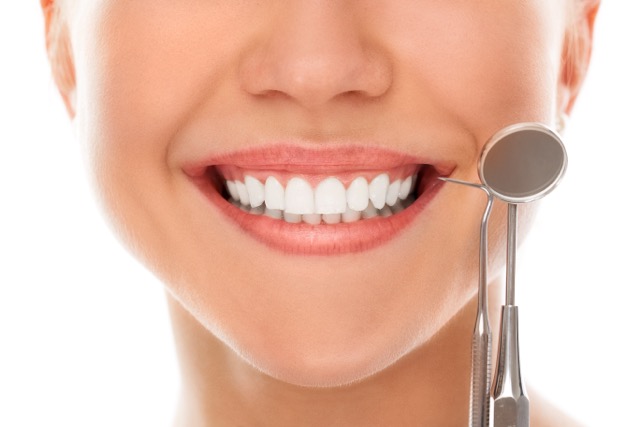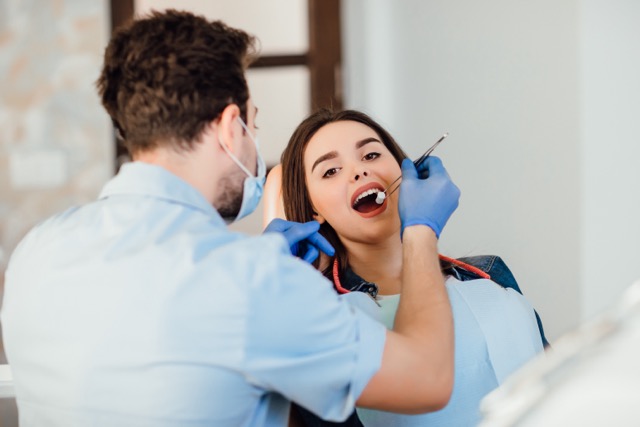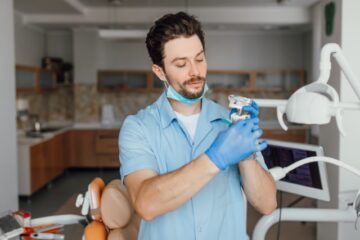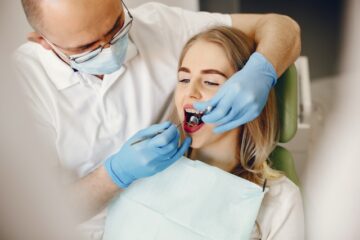Dentist Appointment: How to Prepare for It?

Contents

In a world where the average cost of dental insurance equals $30 per month, people far from Rockefeller’s category want the effect of each dental visit to last as long as possible. Whether you make a regular dentist appointment to improve your oral hygiene or need a thorough overhaul of your Hollywood smile, you can do certain things to ease this stressful experience. Our experts explain how to prepare for a dentist visit correctly and what not to do before a dentist appointment to prevent kicking yourself afterward. Read on and boost your dental appointment efficiency!
6 Tips to Prepare for Your Dentist Visit
Plopping on the patient’s dental chair, with piercing light shining from above, it’s easy to get overwhelmed. You can forget your doctor’s name, not mentioning the right procedure or the tooth in need. The solution is simple: prepare in advance! Here are six things to do before going to a dentist to arrive at a dental office forearmed to the bones.
- Confirm the appointment
Some dental clinics providing top-notch services may call or message you the day before your visit to confirm an appointment. However, it’s better not to count on that gift from heaven so as not to wonder “Do I need to go to the dentist today?” Calling the office yourself the previous day will bring you confidence and peace of mind. Ensure you know the address and develop the correct route to the office. Ask the administrator for clarifications if needed. This will help you arrive at the clinic on time on the day of your appointment.
- Gather necessary documents
Just like you have a passport and a driving license, your teeth boast their medical history documents. What to bring to a dentist appointment? Collect your dental insurance plan (if you have one), medical records, and dental card. This will help your doctor determine the proper dental care approach for you. It’s also smart to find out whether your medical insurance covers the visit.
- Eating before dentist
Hearing your stomach growling like a tiger right in front of your doctor might be embarrassing. Eating before a dentist in two hours will save you from this nasty experience. Don’t forget to clean your teeth afterward (we’ll later explain how to get ready for the dentist to make your mouth look presentable).
You can’t munch and sip every yummy in your fridge. We recommend to avoid:
- strong-smelling foods: onion, garlic, fish, and more. No quality toothpaste will eliminate that odor; that’s a given.
- food rich in food coloring;
- too hot or cold foods and drinks: your teeth will become over-sensitive;
- alcoholic beverages, which might alter the anesthesia effects;
- sweets, sugary drinks, and spicy foods that might irritate your gums.
If you are unsure about eating a certain meal before the appointment, you can contact your doctor and ask them if it is safe in your particular case.
- Oral hygiene before the appointment
Smartening yourself up to prepare for a dentist appointment, remember that your dentist will be dealing with an oral problem in the first place. Show them some respect and ensure your teeth and mouth are clean and orderly:
- Carefully brush your teeth.
- Use a mouthwash to freshen up the oral cavity.
- Gently floss your teeth to get rid of any food particles.
- As a final stroke, clean your tongue—your dentist will surely appreciate it!
- List any concerns or questions
If you have any concerns or questions regarding your teeth condition or a certain procedure, simply write them down. Having everything structured will help you clarify your doubts with the doctor and feel less anxious on the “it” day.
- Arrive early
When it comes to a dental visit, arriving on time isn’t enough. It’s not only about your respect for the beloved dentist. Dental clinics usually offer many forms to fill out, and you surely don’t want to waste your precious time on the paper stuff. Arriving 10-15 minutes before the appointment time will help you stay on the safe side.
What Not to Do Before a Dentist Appointment: Key Mistakes to Avoid
Now that you know what to do before a dentist appointment, let’s switch to things you should avoid. Some might seem evident, but we’ll additionally explain which problems or inconveniences they might cause.
- Tight and uncomfortable clothing. You will spend some time lying down, so comfortable clothes will make you feel more relaxed.
- Excessive makeup. Dental procedures might involve tools, water, spitting, and leaning down with your mouth wide open. Too much lipstick, foundation, and face powder might end up in a mess, so you will have to renew your makeup after the visit. Besides, your doctor might struggle to work properly if the particles of makeup are running down your face. A little mascara and blush won’t harm.
- Excessive or vigorous brushing or flossing. Remember we said oral hygiene is a must before going to the dental office? Brushing or flossing your teeth too hard can cause the opposite effect, irritating your gums and making your teeth overly sensitive.
- Taking painkillers. Some drugs might interact with the remedies prescribed by your dentist. In case of surgery, your doctor can also give you a sedative to keep you comfortable during the operation. If you have acute pain requiring emergency medical attention and can’t bear it anymore, call your doctor for a suitable pain relief option.
- Smoking. Tobacco affects the success of almost all dental procedures. Whether you need tooth extraction or healing root canals, smoking enhances the risk of complications. Avid smokers usually face slower healing or infection after any procedure in the oral cavity and even experience more pain than non-smokers!
- Being shy about communicating with a dentist. Doctors deal daily with anxious patients. Don’t be afraid to ask your dentist about anything you consider important regarding your situation. In the long run, it will build trust between you and the doctor and save you time and money.
- Illness. If you are sick, it’s reasonable to reschedule your dental visit at least a day before the appointment. We highly recommend taking care of your body and letting yourself rest. This is crucial if you have cold symptoms such as sniffles or cough as you might be contagious. Save your doctor from germs and call the dental office to reschedule your appointment until you feel well: no one has canceled the law of karma.
Forewarned Is Forearmed
Regular dental appointments aren’t a mere doctor’s whim: they maintain your teeth healthy for a long time. Proper preparation for each visit is a great investment into your comfort and emotional state, while planned checkups help you prevent serious dental procedures in the future. Consider dental appointments a form of long-term partnership with your dentist: you are in the same boat, sailing toward your oral cavity health.
Frequently Asked Questions Before Going to the Dentist
How to set up a dentist appointment?
To schedule your dentist appointment, call a clinic or make a reservation online via a designated form. The first method is beneficial if you have many questions to clarify. The second offers the convenience of looking through various dates and times to choose the one that suits you best.
How long do dentist appointments take?
Regular dental check-ups usually last from 30 to 60 minutes. The exact time depends on the state of your oral cavity and the date of your last visit.
Can you eat before the dentist?
The question of eating before a dentist is an apple of discord between the specialists in this field. Most dentists agree you should eat something before heading to their office. Avoid certain foods described above and clean your teeth afterward to ensure your oral cavity is fresh and tidy.
Should I go to the dentist with a cold?
If you are coughing or sneezing, we recommend calling a dental office and rescheduling your appointment. First, you risk spreading germs to your doctor and other patients. Second, a runny nose can cause you discomfort during dental procedures.
Additional Resources
Avid smokers wondering why to quit their guilty pleasure before heading to a dental office might acknowledge the article “You Know Smoking Can Impact Your Dental Procedures?” It will give them extra motivation to quit this harmful habit.













